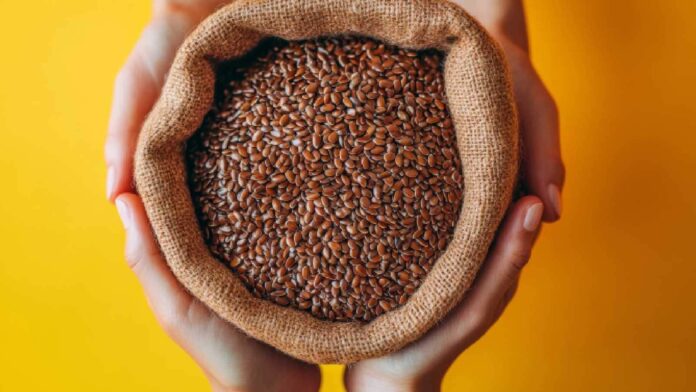Eating the right food can help you poop. Have flax seeds to get relief from constipation, which is a problem with passing stool.
Flax seeds, the small, oval-shaped seeds with a hard, shiny shell, have been in the spotlight for a while. Thanks to their health benefits, they have become a part of many people’s diets. The seeds that come from the flax plant Linum usitatissimum are loaded with fibre, which may help with weight management and getting rid of constipation. You can roast them or have them with warm water. Yes, having flax seeds can provide relief from constipation, but make sure not to have them in excess. Even though they come under the “superfoods” category, there may be side effects of consuming them.
Flax seeds for constipation: How do they help to get relief?
One of the benefits of flax seeds is that they can help to get rid of constipation, which occurs when you poop less frequently and stools become hard and difficult to pass. During a study, published in Nutrition & Metabolism, it was found that consumption of 10 grams of flax seeds baked in cookies daily for 12 weeks helped in improving constipation symptoms. Another study, published in the Journal Of Multidisciplinary Healthcare, found that flax seeds may improve bowel movements in elderly people with chronic constipation. The superfood may serve as an effective diet supplement in constipation management.

Here’s how the superfood may help people with constipation:
1. High fibre
They help relieve constipation primarily because of their high fibre content. “Each tablespoon of whole flax seeds provides nearly 2.8 grams of dietary fibre, with a healthy blend of soluble and insoluble fibre,” says dietitian Varsha Gorey. Insoluble fibre is known for adding bulk to poop by absorbing water and increasing the volume of waste material in the intestine. “This bulk triggers the intestinal walls to contract and push the stool forward more efficiently,” says the expert. On the other hand, soluble fibre dissolves in water to form a gel-like substance that softens the stool, making it easier to pass without straining.
2. Mucilage content
The seeds have mucilage properties, which impact bowel function. “Mucilage is a polysaccharide compound that absorbs water and creates a slippery texture when soaked. This mucilage forms a coating around the stool, reducing friction and easing its passage through the colon,” explains the expert.
3. Maintain a healthy gut microbiome
These seeds help maintain a healthy gut microbiome; their prebiotic properties feed beneficial gut bacteria, which in turn support regular digestion and formation of stool. “For people suffering from chronic constipation or irritable bowel syndrome (IBS) with constipation predominance, these seeds act as a gentle, natural bulk-forming laxative that does not lead to dependency or weaken bowel tone,” says Gorey.
Flax seeds for constipation: How much to take?
Two or three servings of flax seeds and fluids can be consumed on a daily basis, according to the UK’s National Health Service. You can take 10 to 15 grams of flax seeds (between 1 to 2 tablespoons) with 150 ml of liquid like water or milk. “This quantity provides enough fibre to stimulate regular bowel movements while being safe for daily consumption,” says Gorey. It’s important to start gradually, ideally with 1 tablespoon in a day, especially if you are not used to having foods high in fibre.
Also, have the seeds with ample water, ideally at least 2 to 2.5 liters of water per day, as the fibre content absorbs water in the gut. “If you take flax seeds without adequate hydration, it may actually worsen constipation by hardening the stool,” says the expert. Ground flax seeds (as opposed to whole) are better absorbed by the body and more effective for constipation relief because the tough outer shell of whole flax seeds can pass through the digestive tract undigested.
How to use flax seeds for constipation?
Flax seeds can be used in the following ways to ease constipation:
- The most effective way to use flax seeds is to consume ground flaxseed powder mixed in warm water. You can roast and grind flax seeds into a fine powder and stir 1 tablespoon of the superfood into a glass of warm water to drink on an empty stomach each morning. “This kickstarts digestion and provides a bulk-forming laxative effect,” says the expert.
- You can prepare flax seed laddoos using roasted flax seed powder, jaggery, and ghee (clarified butter). It is a delicious and nutritious snack rich in fibre and healthy fats.
- Have flax seed chutney powder, which can be added to dosa, idli, or rice, making it easy to incorporate into daily meals.
- Flax seed water is an excellent option to get relief from constipation. Simply soak 1 tablespoon of whole flax seeds in a cup of water overnight. By morning, the water becomes thick and mucilaginous, so drinking this gel-like water helps coat the intestinal lining and promotes smooth bowel movements.
- Ground ones can be easily added to breakfast dishes like oats and smoothies. This integrates fibre into the first meal of the day, which helps regulate the digestive tract.

What are the side effects of having flax seeds for constipation?
They are generally safe and beneficial, but consuming them in excess or without adequate water can lead to side effects:
- You may experience gastrointestinal side effects, including bloating, flatulence, and abdominal cramps, particularly if you increase fibre intake too rapidly. If not accompanied by enough fluids like water or juice, the fibre in these seeds can cause the stool to harden and lead to a worsening of constipation.
- Overconsumption can also result in loose stools or diarrhea in some individuals, particularly when the body isn’t accustomed to high-fibre foods.
- They contain lignans, which have weak estrogenic effects. “While this is beneficial for many, people with hormone-sensitive conditions such as breast or ovarian cancers should consult a doctor before regularly consuming them,” says the expert.
- Rarely, some people may experience allergic reactions to these healthy seeds, including itching and rashes.
- These seeds may interfere with the absorption of medications, including blood thinners and thyroid drugs, due to their mucilage content and fibre. “It is better to take medications at least 1 to 2 hours apart from flax seed consumption to avoid interference,” says the expert.
Constipation makes it hard to poop, which can cause a lot of discomfort. Eating flax seeds can provide some relief. However, it is important to start with a small amount to avoid side effects like abdominal cramps and bloating.
Related FAQs
Can you drink flax seed water daily?
Yes, drinking flax seed water daily is generally safe and beneficial. A daily glass of flax seed water (made with 1 tablespoon of whole seeds soaked overnight in 1 cup of water) can be particularly effective for people dealing with mild constipation, hard stools, or post-operative bowel sluggishness.
When to eat flax seeds, morning or night?
The best time to consume flax seeds depends on your health goal, but for constipation relief, morning consumption is typically more effective. Taking flax seed water or ground flax seeds mixed in warm water on an empty stomach can help stimulate the gastrocolic reflex, promoting a morning bowel movement.

